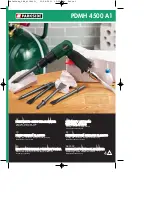
10
Fig. 7
Hand Safety and Placement
Never pass the hands directly over the cutter
knife. As one hand approaches the knives
remove it from the stock in an arc motion and
place it back on the stock in a position beyond
the cutter knife. See Fig 7.
When feeding the work piece, pressure is
applied not only toward the cutterhead but
against the fence and down to the table as well.
At the start of the cut, the left hand holds the
material down and toward the fence while the
right hand pushes toward the cutterhead. As
the material crosses the cutterhead the left
hand comes up and over as in Fig 7 to
continue the pressure but now on the outfeed
table. As the right hand approaches the
cutterhead it is time to move it up and over the
cutterhead in the same fashion as the left in
Fig 7 all the while continuing pressure as
stated above.
WARNING: Keep all guards in place. Keep hands
away from the cutterhead! Always use push stick
when possible.
Failure to comply may cause serious injury.
Jointing
In order to craft a good woodworking project, it
is necessary to have a square piece of wood to
start with. The way to do this is with a jointer.
You need one straight edge and one flat face.
After you have these, you can plane to
thickness and rip to width and the resulting
piece will be square and true on all four sides.
At this point you can begin building your
project.
Direction of the Grain
To avoid tear out, always feed the material in
the direction of the grain. If the direction of the
grain changes half way through the board, try
taking lighter cuts at a slower feed rate. If the
results are still unsatisfactory, try turning the
material around and feeding the other way.
Fig. 8
(Fig. 8)
Summary of Contents for 4260
Page 22: ...Fence...
Page 23: ...Tables...
Page 24: ...150 Cabinet...
Page 25: ...Base...
Page 30: ...27...













































